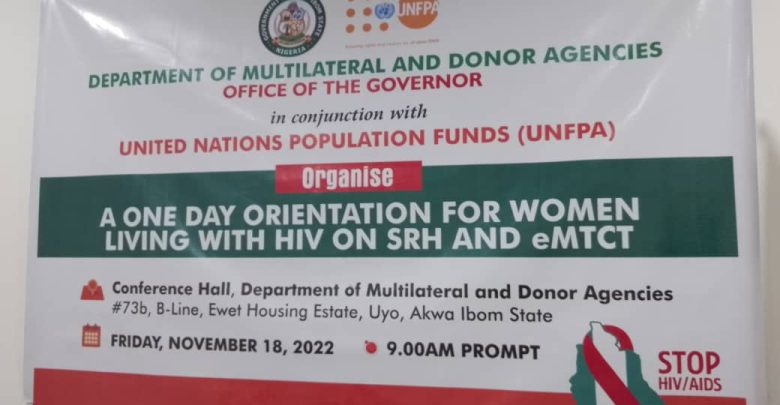
When Augustina (not her real name) gave birth to her second child, joy enveloped her household. The joy soon gave way to anxiety and distress when it was discovered that the child was born with the Human Immunodeficiency Virus (HIV).
Before the pregnancy, Augustina and her husband had tested positive for the virus and were duly counselled and placed on antiretroviral medications.
Medical doctors had told the couple that they could still have healthy, HIV-negative children if they stick faithfully to prescribed medications. When therefore the child was born, the blame was on the mother, Augustina, who said health workers had to prove that she skipped some daily dosage of her medications.
“The child is now 5 years old, he is also on antiretroviral drugs. At birth, it was surprising to me that he was positive but he is now living normally like other kids. I advise HIV-positive mothers to take their drugs regularly and adhere strictly to the advice of health workers,” said Mrs Augustina, who was part of a one-day orientation on Sexual and Reproductive Health (SRH) and ending Mother-To-Child Transmission (MCT) for women living with HIV in Akwa Ibom State.
The workshop held in Uyo, Friday, November 18, 2022, was organized by the Department of Multilateral and Donor Agencies in collaboration with the United Nations Population Funds, and the United Nations Sexual and Reproductive health Department.
The Department of Multilateral and Donor Agencies is supervised by the Office of the Governor of Akwa Ibom State. Mr NdianaAbasi Udom heads the agency as Senior Special Assistant to the Governor.

Resource person at the workshop, Mrs Emem Xavier, a Director in the Akwa Ibom State Ministry of Health, said Mrs Augustina’s experience coupled with rising cases of the infection in the state underlines the need for stringent measures to be adopted if the trend is to be reversed.
Read Also: Akwa Ibom TRC Seeks Improved Attention To Primary Healthcare
According to her, Akwa Ibom State should not lag in the race to meet the 2030 deadline set by the World Health Organization (WHO), the Sustainable Development Goal (SDG-3) Project 2030 and other agencies for the eradication of the pandemic.
For the goal to be achieved, Xavier insisted that women and pregnant women have a crucial role to play.
“Without women, no child is born naturally. The deadline is 2030, such can only be met if we stop birthing HIV-positive children. No child deserves to be born with the virus in an era where there is so much awareness and medication to keep the infection at bay. As mothers, we must safeguard the world by taking advantage of medical innovations now made available at no cost,” she stressed.
Xavier mentioned that mothers can pass the infection to their children during pregnancy, during birth and breastfeeding. She recommended early detection, regular screening, diligent adherence to recommended medications, abhorrence of alcoholism and illicit drug usage which may reduce the effect of antiretroviral medications, and informed breastfeeding as ways in which a mother can avoid infecting the child.
Furthermore, Mrs Xavier implored carriers to enrol at Prevention of Mother-To-Child Transmission Centres (PMTCTC) across the state where they are always screened, counselled and given free antiretroviral medications.
Describing the female gender as more vulnerable, the resource person referenced available data indicating that the rate of new HIV infections among adolescent girls and young women is substantially higher than among males of the same age bracket because HIV is more commonly spread around by male sexual partners who are a few or several years older.
Read Also: Ibeno Communities, PPDF Hit Streets with Campaign Against Environmental Pollution
Continuing, she emphasized the need for abstinence for unmarried persons, proper and consistent use of condoms, use of sterilized sharp instruments on the skin, and non-exchange of bodily fluid, among others as ways of preventing the virus.
The resource person commended the Akwa Ibom State Government for its utmost commitment to fighting the scourge but appealed to Akwa Ibom residents to complement the government’s efforts by adhering to the highlighted guidelines.
She also applauded organizations like the World Health Organization, United Nations, National Agency for the Control of AIDS, State Agency for Control of AIDS, and other bodies for sustaining the fight against HIV.
“The process of ending the AIDS pandemic is on course, and we must contribute our quota. A good example is Cuba, which has reached near zero new infection state. Such should be replicated here,” Mrs Xavier submitted.
The SSA to the Governor on Multilateral and Donor Agencies, Mr NdianaAbasi Udom appreciated participants for always embracing the programme and promised that the agency will continue making the rights and privileges of persons living with HIV/AIDS a priority.
Udom, who was represented at the workshop by a director in the agency, Mr Edmond Effiong, reassured the participants that the Akwa Ibom State Government will continue partnering with agencies and organizations that have genuine intentions and plans for the state.
Participants also appreciated the agency, United Nations and the Akwa Ibom State Government for the gesture.
An interactive session was a main feature of the workshop.




